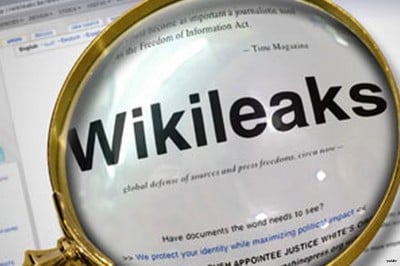Digital Information Warfare: WikiLeaks, Assange and the US Presidential Elections

In all disproportion to size and physical heft, WikiLeaks has managed to throw bombs of digital worth into various political processes with marked effect. While its critics and detractors deny and attempt to dispel its influence, the authorities are still concerned. So concerned, in fact, that they have attempted, over the years, to curb the reach and access to the website, and its chief publisher, Julian Assange.
Within these asymmetrical power relations between the publishing outfit and state actors lies Assange, assiduously engaged in activities that have already proven historical in value. They, in the main, have taken place without molestation from the Ecuadorean authorities who front as hosts for him in the London compound.
Hardly having the warmest set of relations with Washington, Ecuador has generally kept the issues it might have with Assange at arm’s length. It was not a state of affairs that would last. Assange has been particularly hot in the current US presidential campaign, with the release of email exchanges connected with the Democratic National Committee, Hillary Clinton’s own emails and the latest Podesta files.
On Saturday, WikiLeaks released the contents of three speeches made by the Democratic nominee for the White House to Goldman Sachs. Clinton was handsomely remunerated, a point that should permanently disable any notion about partiality in the context of regulating Wall Street and its more resilient demons.
Ever since the Clinton campaign started springing more leaks than a refugee vessel, its frazzled managers have been attempting to guard the content of those deliveries with fanatical, if misplaced dedication. Inconsistencies and worries have been flagged, all of these available in email exchanges from Clinton campaign chairman John Podesta.
This week, it became clear that other factors were at play, with Ecuador acknowledging that Assange’s internet access had been restricted. The Ecuadorean Ministry of Foreign Affairs and Human Mobility found itself having to fend off suggestions that Washington had been breathing heavily down the neck of its officials. The emphasis was, rather, on untrammelled sovereignty – the country, after all “does not cede to pressures from other countries”.
To that end, “Ecuador, exercising its sovereign right, has temporarily restricted access to part of its communications systems in its UK embassy.”[1] The stance of not bowing to pressure was less than convincing given the prefacing comments noting how WikiLeaks had “in recent weeks […] published a wealth of documents, impacting the US election campaign.” Furthermore, the country respected “the principle of non-intervention in the internal affairs of other states” including “external electoral processes”.
WikiLeaks itself claimed that “multiple US sources” had informed it that US Secretary of State John Kerry “asked Ecuador to stop Assange from publishing Clinton docs during FARC peace negotiations.”[2]
The digital conflict has also thrown up desperate turns. Podesta, whose political impotence in this has been near total, decided last week to take a rather vulgar approach against Assange. It came soon after his own Twitter account had been hacked to display a pro-Trump message. “I bet the lobster risotto,” tweaked Podesta to Assange as he can be seen preparing the dish, “is better than the food at the Ecuadorean embassy.”[3] The snappy response was immediate. “Yes, we get it,” went WikiLeaks. “The elite eat better than the peasants they abuse.”
The digital war that has unfolded during the course of this presidential election is one for narrative and reality. The effort from the Clinton campaign to foil access, seek vengeance on the whistleblower, and draw Russia into the debate has reached maniacal proportions. Some on the Right of US politics have even gone so far as to grace WikiLeaks with their blessings, among them Rep. Jeff Duncan, who even thanked the divine for publisher’s work in frustrating the meek efforts of mainstream media.[4]
Another limb in the campaign that has unfolded in the last few days features efforts to remind the humble reader, and possessor, of stolen documents connected with WikiLeaks, how the intrusive arm of the law might well interfere.
Chris Cuomo of CNN got busy claiming with faux paternalism how “it’s illegal to possess these stolen documents. It’s different for the media. So everything you learn about this, you’re learning from us.” Keeping it mainstream; keeping it tepid; and most importantly, keeping it unreal.
That effort to control access and frame the means which such emails and data can be distributed flies in the face of US jurisprudence. On several occasions in US legal history, courts have noted that the First Amendment protects both the media and the general public, including instances of distributing illegally obtained material.
In New York Times Co. v Sullivan, 376 U.S., 265-6 (1964), the bench laid heavy emphasis on the “persons who do not themselves have access to publishing facilities” as having equal entitlements to those who did. In Bartinicki v Vopper, 532 U.S. 514 (2001), privacy gave way to the interest in publishing matters of public importance, notwithstanding that the phone call intercepts in that case were obtained illegally, then distributed.
Even the less legally aware would note the case of New York Times Co. v United States, 403 U.S. 713, which famously disregarded the fact that the documents in question had been stolen by a third party. What mattered was the nature of the stolen documents’ character and consequences of public disclosure.
As the Clinton campaign emphasises the stolen character of the data in a hope of some miraculous rite of purification, WikiLeaks remains committed in refocusing attention on one of the least attractive contenders for the White House in US political history. Substance does sometimes count more than form, and the messages are there to prove it.
Dr. Binoy Kampmark was a Commonwealth Scholar at Selwyn College, Cambridge. He lectures at RMIT University, Melbourne. Email: [email protected]
Notes

